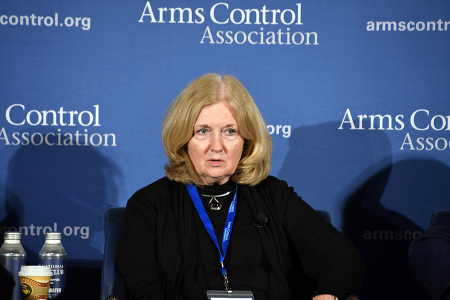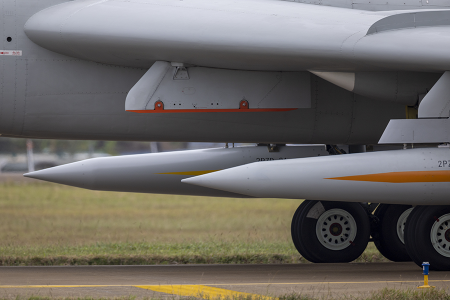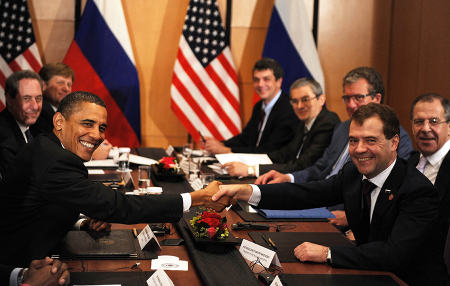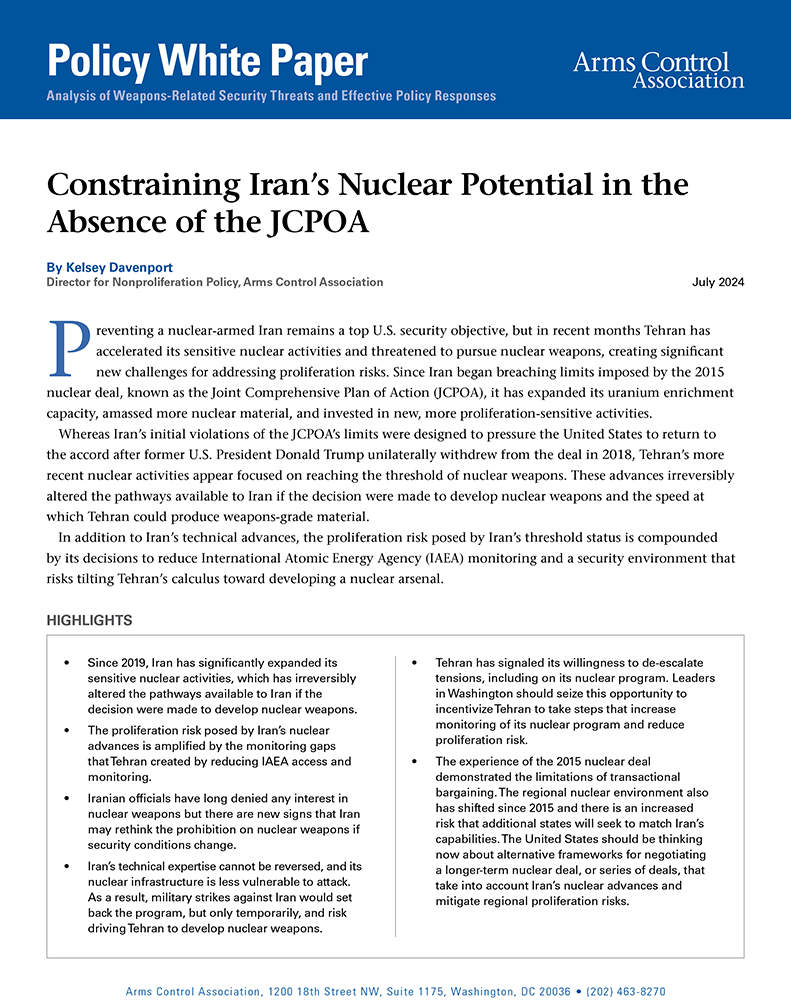July/August 2024
By Daryl G. Kimball
The experience of the Cold War proves that nuclear arms racing produces only losers and increased risks for everyone.

Nevertheless, following more than a decade of deteriorating relations between the United States and its main nuclear rivals, dimming prospects for disarmament diplomacy, and major nuclear weapons modernization efforts, China, Russia, and the United States are now on the precipice of a dangerous era of unconstrained nuclear competition. Concern in U.S. national security circles about Chinese and Russian nuclear capabilities has grown since Russia’s full-scale invasion of Ukraine effectively shut down the U.S.-Russian nuclear risk reduction and arms control dialogue. The Kremlin has rejected the White House proposal to negotiate a new nuclear arms control framework to replace the New Strategic Arms Reduction Treaty (New START), which expires on February 5, 2026.1 China has declined U.S. offers to continue bilateral discussions on reducing nuclear risk and on nuclear postures.2
Moreover, as the U.S. intelligence community forecasts that China could amass as many as 1,000 nuclear weapons by 2030, with several hundred of them deployed on a larger force of intercontinental ballistic missiles (ICBMs), some members of the nuclear weapons establishment, leading members of Congress, and Biden administration officials have suggested that the massive U.S. arsenal may not be sufficient to deter two “near peer” nuclear rivals.3 China is currently estimated to have some 500 nuclear weapons and 310 long-range, nuclear-armed ballistic missiles.4
In response, proposals have been advanced to expand the U.S. nuclear modernization program to provide the United States with the capability and flexibility to deploy more strategic nuclear weapons on more delivery systems and field new types of theater-range nuclear weapons. Some experts argue that the United States should prepare to build up its deployed nuclear force at some unspecified future point while others suggest that such efforts should begin now.
An expansion of Russian and U.S. deployed nuclear forces would be unnecessary, counterproductive, and expensive for both sides. Adding more nuclear warheads to missiles, fielding more nuclear-capable bombers, or deploying nuclear-armed cruise missiles would not enhance deterrence capabilities or improve security. If one side were to break out of the New START limits, the other side could match the increase and further stimulate China’s effort to increase its strategic nuclear force so as to maintain an assured retaliatory strike capability.
The United States is estimated to have roughly 3,700 warheads in its active arsenal. This includes 1,670 thermonuclear warheads deployed on 660 powerful long-range missiles on land and at sea or available for delivery on strategic bombers. There are also another 100 tactical nuclear bombs that can be delivered on shorter-range aircraft, according to independent estimates.5 The use of a fraction of these weapons, many primed for launch within minutes, would lead to mass destruction on an unprecedented global scale.
Contrary to the hype, more nuclear weapons would not improve, on balance, the U.S. capability to deter nuclear attack. In fact, significant increases in the U.S. deployed nuclear arsenal would undermine mutual and global security by making the existing balance of nuclear terror more unpredictable and would set into motion a counterproductive, costly action-reaction cycle of nuclear competition.
A Russian-U.S. breakout from the New START limits would constitute a reversal of a quarter century of progress to reduce the two nations’ bloated nuclear arsenals and likely encourage China to accelerate its nuclear buildup. Expanding Chinese, Russian, and U.S. nuclear forces also would represent a gross violation of the three states’ obligation under Article VI of the nuclear Nonproliferation Treaty (NPT) to engage in good faith negotiations to end the arms race and pursue disarmament. It would deliver a body blow to the international nuclear nonproliferation system. Halting spiraling nuclear tensions is in every nation’s interest.
The U.S. Modernization Program
Since the early 2010s, the United States has been pursuing an ambitious multidecade, multi-billion dollar, across-the-board effort to modernize, upgrade, and maintain its entire nuclear enterprise. This includes programs to field 400 new ICBMs called Sentinels, 12 Columbia-class strategic submarines, and 100 nuclear-armed B-21 Raider strategic bombers.
In addition, the United States is producing a new nuclear-armed, air-launched cruise missile and pursuing a new nuclear-armed, sea-based cruise missile. The National Nuclear Security Administration (NNSA) is overseeing an effort to refurbish all nuclear warhead types, developing a new-design warhead called the W-93, and building two new plutonium pit production facilities that together can produce 80 units per year.6
Costs have risen steadily above initial projections. In 2017 the Congressional Budget Office (CBO) estimated that the plans President Donald Trump inherited from President Barack Obama to maintain and upgrade the arsenal over the next 30 years would cost $1.2 trillion in current dollars. By 2023 the CBO estimate had risen to more than $1.5 trillion over the next 30 years.7
According to the CBO, the plans of the Department of Defense and Department of Energy call for spending more than $756 billion in 2023-2032, or an average of just more than $75 billion a year. Some of these programs are more expensive, risky, and vulnerable to delay or cancellation than others. For example, the Air Force announced in January that the new Sentinel ICBM would cost 37 percent more than previously expected and take about two years longer than planned to build and deploy.8 The cost hike puts the Sentinel program in a “critical” breach of the Nunn-McCurdy Act, a law designed to prevent major cost overruns.
The law requires that the Sentinel program be terminated unless the secretary of defense certifies in writing that the program is essential to national security, there are no alternatives that will provide acceptable capability, and the new cost estimates are reasonable. In addition, the secretary must certify that the program is a higher priority than programs whose funding will be reduced to cover the increased cost of the Sentinel program and that the management structure is sufficient to control additional cost growth.
In a June 24 letter to Defense Secretary Lloyd Austin, several congressional members who are highly skeptical of the need for and affordability of the Sentinel ICBM charged that “public statements by [department] officials have not provided confidence that this review is being conducted in the manner required by law.”9 They also noted that “there is still no integrated master schedule encompassing the full scope of work, anticipated timelines, and resource phasing for all government and contractor lines of effort. Unfortunately, this trend of escalating costs and unstructured schedules is likely far from over.” The skepticism was warranted. In its July 9 certification decision, the Pentagon announced that the total cost of the Sentinel missile program had ballooned to $141 billion or 81 percent above initial estimates. It is three years behind schedule.10
The delay in fielding the new ICBMs likely will increase the cost of extending the service life of the 400 existing Minuteman III ICBMs now deployed in silos in Colorado, Montana, Nebraska, North Dakota, and Wyoming. As a result of delays affecting the Sentinel and Columbia-class submarine programs, Biden administration officials say that they are “seeking to extend the life of certain Ohio-class ballistic missile submarines to provide additional margin during the transition from legacy to modern capabilities across the triad.”11
U.S. Expansion Proposals
Despite the immense, expensive array of existing U.S. nuclear firepower and the booming cost of the modernization program, lobbyists for defense contractors, defense industry-affiliated think tanks, and some members of Congress want to invest even more in building up the U.S. defense enterprise. In October 2023, the 12-member Congressional Commission on the Strategic Posture of the United States issued a detailed report outlining options to add more capability and flexibility to the U.S. strategic deterrent to counter two near-peer nuclear adversaries.12 Yet, crucial matters were unaddressed. The commission did not estimate the costs of its recommended options and did not evaluate how adversaries might counter moves by the United States to augment its existing nuclear force. As Adam Mount, nonresident senior fellow at the Federation of American Scientists, has argued, the commission’s report also makes no attempt to describe which categories of adversary targets must be held at risk or why these targets require more U.S. nuclear capabilities.13 Nevertheless, the report recommended that several “strategic nuclear force posture modifications should be pursued with urgency.” [See Box 1.]
Box 1. The Congressional Commission’s Key Options for Augmenting U.S. Nuclear Forces - Prepare to and exercise the upload of some or all hedge warheads on deployed intercontinental ballistic missile (ICBM) and submarine-launched ballistic missile (SLBM) systems
- Plan to deploy the Sentinel ICBM with a multiple warhead configuration
- Increase the planned number of deployed nuclear-armed, air-launched cruise missiles on strategic bombers
- Increase the planned number of B-21 bombers and the associated tankers
- Increase the planned production of Columbia-class ballistic missile submarines and their Trident ballistic missile systems
- Pursue the feasibility of fielding some portion of the future ICBM force in a road-mobile configuration
- Develop plans and procedures to reconvert SLBM launchers and B-52 bombers that under the New Strategic Arms Reduction Treaty were rendered incapable of launching a nuclear weapon
- Initiate planning and preparations for a portion of the future bomber fleet to be on continuous alert status by 2027
|
The report also says that the “U.S. theater nuclear force posture should be urgently modified in order to…provide the president a range of militarily effective nuclear response options to deter or counter Chinese or Russian limited nuclear use in theater” and to “[a]ddress the need for U.S. theater nuclear forces deployed or based in the Asia-Pacific theater.”
Some commissioners in their individual capacities, such as Frank Miller, have argued that “deterring China and Russia simultaneously [requires] an increased level of U.S. strategic warheads” and enhancing U.S. substrategic nuclear capabilities.14 Miller proposed that the United States should seek a new arms control agreement with Russia that allows it to increase the size of its strategic and tactical nuclear force to some 3,500 nuclear warheads, roughly twice the current number.15
Key elements of the commission’s options for enhancing the current U.S. nuclear force have found their way into several legislative proposals this year. Some of these may be codified into law by year’s end, including restoring nuclear capabilities across the B-52 strategic bomber fleet, requiring that no fewer than 400 deployed ICBMs be on alert, fielding a plan for acquiring and deploying up to 450 Sentinel ICBMs, and funding development of a new nuclear-capable, sea-launched cruise missile system and the associated nuclear warhead.16
None of the congressional proposals evaluate what countermoves adversaries might adopt, nor do they provide a strategic rationale for why augmenting the U.S. arsenal is necessary to maintain the U.S. capability to deter a nuclear attack.
A ‘More Competitive’ U.S. Approach
On June 7, a senior White House official provided an update of the Biden administration’s approach to nuclear deterrence and arms control that was delivered a year earlier by National Security Advisor Jake Sullivan. The update, by Pranay Vaddi, the National Security Council’s senior director for arms control, disarmament, and nonproliferation, at the Arms Control Association annual meeting was billed as a “more competitive approach.” In comparison to the strategic posture commission, however, it outlined a more sober and balanced mix of strategies to deal with the possibility of nuclear competition with China and Russia without arms control limitations. Nevertheless, the Biden administration also hinted about the need to make possible adjustments to the composition and size of the U.S. nuclear force down the road.17
Vaddi reiterated the June 2023 U.S. offer for talks “without preconditions” with Russia on a new nuclear arms control framework following the expiration of New START and for further engagement with China on nuclear risk reduction issues. He noted that President Joe Biden recently issued updated the nuclear weapons employment guidance, which “takes into account the realities of a new nuclear era.” It “reaffirms our commitment to use arms control and other tools to minimize the number of nuclear weapons needed to achieve U.S. objectives…and reiterates that the United States will continue to abide by New START limits for the duration of the treaty, so long as Russia does the same,” Vaddi said.
Although Russia in early 2023 announced plans to suspend implementation of New START, it said it would observe the limits on the number of strategic warheads that can be deployed until the treaty expires to maintain “stability in the nuclear missile area.” The United States continues to assess that Russia has not exceeded the New START limits.18
Vaddi also noted that the administration is “thinking through what a future arms control agreement with Russia after New START might look like.” Yet, with New START due to expire in fewer than 600 days and the prospects for a new, formal nuclear arms framework dim, he also warned that “[w]e must be prepared for the possibility that these constraints disappear without replacement.” [See Box 2]
Box 2. Russian-U.S. Breakout Potential After New START The most efficient way that the United States or Russia could increase the size of their deployed nuclear arsenals would be by “uploading” reserve warheads after the New Strategic Arms Reduction Treaty (New START) expires in 2026. This would occur in the absence of a mutual agreement not to increase their respective deployed strategic arsenals beyond the New START limits of 1,550 warheads and 700 long-range missiles and bombers each. In theory, each side could double the size of their current deployed strategic arsenals, possibly within one to two years, by uploading additional warheads from their reserve stockpiles onto their existing strategic missile and bomber systems, according to an independent estimate. If the two countries were to arm their delivery systems to accommodate the maximum number of possible warheads, the United States could increase the number of deployed strategic warheads to 3,570 on 715 strategic launchers, and Russia could increase the number of its strategic deployed warheads to more than 2,630 on 533 existing strategic launchers.a U.S. military planners have maintained this “hedge” arsenal of reserve warheads and excess nuclear weapons delivery capacity for decades. |
“[W]e do not need to increase our nuclear forces to match or outnumber the combined total of our competitors to successfully deter them,” Vaddi said, while adding that, “absent a change in the trajectory of adversary arsenals, we may reach a point in the coming years where an increase from current deployed numbers is required.” Vaddi did not explain what factors might lead Biden to determine that more nuclear weapons are necessary to deter a strategic attack from nuclear adversaries. He only hinted that “[i]t will not be a simplistic calculation that more for them requires more for us.”
Vaddi was not specific about how many years from now the Biden administration might want to consider some increase in the U.S. force size or structure beyond the current ceilings set by New START. The administration’s commitment to stay within the New START limits into 2026 and to negotiate a new framework agreement with Russia suggests the decision is unlikely to come before 2027 and could be much later depending on the trajectory of China’s strategic nuclear buildup.
Vaddi also was not specific about what new force options might be considered other than to say that the White House is focused on a “better” approach, not necessarily a “more” approach, which will require some creative solutions and potentially discrete capabilities that fill an important niche.” He noted that as the administration considers possible adjustments, it is important to “keep in mind…the implications for strategic stability, the capacity of our defense and nuclear enterprise, and competing budget priorities.” The latter points reflect the growing concern inside the executive branch about the skyrocketing costs of the nuclear modernization program, the already stretched capacity of key defense contractors to deliver, and the challenges facing the NNSA as it fulfills its mandate to execute complex warhead life-extension campaigns in the coming years.
A Reality Check
The challenge of deterring two major nuclear adversaries instead of one is far more complex than simple arithmetic. Building up the current U.S. deployed nuclear weapons arsenal is not only unnecessary, but it would be counterproductive and prohibitively expensive.

As Austin noted in remarks at Strategic Command Headquarters in December 2022, “Nuclear deterrence isn’t just a numbers game. In fact, that sort of thinking can spur a dangerous arms race.” Madelyn Creedon, chair of the strategic posture commission, also was dismissive of those who advocate for a U.S. nuclear “overmatch.” Speaking on a panel at the June 7 Arms Control Association annual meeting, she said that “when people say that ‘we have to have the same numbers as the combined total of everybody else, it makes no sense, it absolutely makes no sense.”
In response to Obama’s guidance in 2013, the Pentagon issued a nuclear weapons employment document that reported that, “[a]fter a comprehensive review of our nuclear forces, the president has determined that we can ensure the security of the United States and our allies and partners and maintain a strong and credible strategic deterrent while safely pursuing up to a one-third reduction in deployed nuclear weapons from the level established” in New START.19 Such a reduction would have slashed the U.S. strategic arsenal to approximately 1,000 deployed warheads, but it was never pursued because Russia refused Obama’s proposal for talks on further mutual strategic arms cuts.
Despite Russia’s reckless behavior over the last decade and China’s more recent push to increase its own strategic nuclear retaliatory force, the scale and diversity of the U.S. nuclear arsenal still exceed what is plausibly necessary to hold a sufficient number of adversary targets at risk so as to deter an enemy nuclear attack. That is true whether there is a sudden crisis or conflict or a longer-term effort to dissuade nuclear-armed adversaries from launching a massive surprise attack.
As Steve Andreasen, former National Security Council director for defense policy and arms control, recently wrote, “Adding more nuclear weapons…will not change the nuclear fundamentals.”20 Nuclear deterrence is based on the threat of retaliation in response to a nuclear attack. It is implausible that China or Russia would conclude that they could degrade U.S. nuclear capabilities sufficiently with a first strike, even in the highly unlikely scenario of a joint Chinese-Russian first strike, and avoid massive nuclear retaliation.

The U.S. strategic submarine force alone can deliver a retaliatory strike that would devastate any current or future nuclear adversary that was foolish enough to launch an attack. There are more than 1,000 nuclear warheads on 8 to 10 invulnerable U.S. ballistic missile submarines continuously at sea. Just one submarine, which normally carries 20 ballistic missiles loaded with 100 warheads, each with a yield of 90 kilotons or more, could obliterate a large country and kill many tens of millions of people in the first hours of a major nuclear exchange.
There is no evidence to suggest that China and Russia will not continue to be deterred from initiating a nuclear attack by the current U.S. deployed strategic force even if their combined nuclear forces exceed that of United States. None of the proposals for augmenting the U.S. nuclear force attempt to explain why the existing powerful arsenal would be insufficient to inflict devastating damage on an adversary’s assets or how additional U.S. strategic forces would help address any perceived “deterrence” gaps.
Nevertheless, proponents of the nuclear-armed, sea-launched cruise missile, which would cost more than $10 billion, argue that this weapon would give the president additional and “more credible” options in the event of a regional war. The Biden administration countered in its statement of administration policy on the 2023 National Defense Authorization Act that this missile is of “marginal utility” and “would divert resources and focus from higher modernization priorities for the U.S. nuclear enterprise and infrastructure.” A year later, however, having failed to end the program, the administration said in a written reply to Arms Control Today, “We will comply with the [defense act] requirement and will look to execute in a manner that provides the most deterrence value for the least risk to the modernization program, the production enterprise, and other defense priorities.”21
If nuclear weapons, such as this nuclear-capable cruise missile, are used in a regional conflict involving nuclear-armed adversaries, there is no guarantee that the face-off could be limited and not escalate to all-out, global nuclear war.
Achieving or maintaining numerical nuclear parity may seem superficially necessary to deter nuclear aggression, or it may be politically expedient for members of Congress to suggest that the United States do so. In reality, given the overwhelming power of nuclear weapons, there is no strategic or deterrence logic that requires that the United States respond to a buildup of nuclear weapons by its adversaries with more nuclear weapons of its own.
As Congress and the executive branch evaluate options to address nuclear challenges posed by China and Russia in the years ahead, it would be prudent to examine in detail and more transparently the underlying assumptions that drive the current thinking about U.S. nuclear strategy and force requirements. For instance, the president should adjust which categories of targets are appropriate under which war scenarios, reconsider what amount of damage he wants to threaten to impose on adversaries under various circumstances, and evaluate how much risk and damage the United States should be willing to accept if an adversary carries out a surprise nuclear attack or decides to use nuclear weapons first in a regional conflict. Changes in these parameters could lead to overdue adjustments to the so-called military requirements for deterring adversary nuclear weapons use, which in turn could lead to more modest and prudent judgments about how many nuclear weapons are “enough” to deter nuclear attack.
In the post-Cold War era, significant changes have been made in these areas, leading to significant reductions in the size and diversity of the U.S. stockpiles. The president can and should make more changes to the underlying guidance for nuclear deterrence strategy that would reduce the salience of nuclear weapons and facilitate reductions in the nuclear force.
Before Congress or the executive branch takes further steps to increase the overall size of the U.S. deployed nuclear arsenal, there should be a serious public examination of the serious risk of doing so. In the current geostrategic and political context, any decision to increase the number of deployed U.S. strategic nuclear weapons above New START levels could accelerate an action-reaction cycle involving China and Russia, further undermining strategic stability and increasing the risk of nuclear war. For example, building up the U.S. strategic nuclear force or adding new capabilities, such as a nuclear-capable sea-launched cruise missile, very likely would encourage China to deploy even more nuclear weapons on an even wider array of delivery systems over the coming decade. It would prompt Russia to match any increases in U.S. nuclear force deployments, all of which could negate any perceived gains to U.S. deterrence capabilities.
If the president and the Pentagon believe there are additional military targets that leaders in Beijing or Moscow value and Washington has a military reason to hold at risk, they should examine non-nuclear options that could effectively do the job. These options could include prioritizing U.S. conventional military capabilities, coordinating with the conventional forces of U.S. allies, and using U.S. space, cyber, economic, and diplomatic tools.
Congress, the executive branch, and the public need to consider the fact that increasing the number of deployed U.S. strategic nuclear weapons or adding new types of nuclear war-fighting weapons to the arsenal also would be prohibitively expensive. The Biden administration’s $850 billion defense budget request for fiscal year 2025 already calls for $69 billion for nuclear weapons operations, sustainment, and modernization, an increase of 22 percent over the current fiscal year.22 Of the Pentagon’s major defense acquisition programs, nuclear weapons modernization accounts for about a quarter of the projected costs for 2025, amounting to $23.4 billion out of $96.1 billion. The costs of the nuclear weapons modernization program will rise even further if some or all of these proposals are pursued and will put even more severe pressure on the U.S. ability to fund other urgent defense and human security priorities.
The Priority of Sensible Nuclear Arms Control
To its credit, the strategic posture commission acknowledged the value of effective nuclear arms control, although the report underplays the importance of this tool as well as the opportunities and options for maintaining meaningful nuclear restraints. For more than 50 years, U.S. presidents of either party have recognized the value of nuclear arms control to constrain adversary capabilities that can threaten the United States, its allies, and the world. That is why the Biden administration’s 2022 Nuclear Posture Review states that “[m]utual, verifiable nuclear arms control offers the most effective, durable and responsible path to reduce the role of nuclear weapons in our strategy and prevent their use.”

That is also why Sullivan said in June 2023 that the United States is ready to engage in nuclear arms control diplomacy with Russia and with other nuclear-armed members of the NPT, including China, without preconditions. With respect to Russia, he said that “rather than waiting to resolve all of our bilateral differences, the United States is ready to engage Russia now to manage nuclear risks and develop a post-2026 arms control framework.” Russia has refused the offer so far, but government statements and behavior suggest that Russian President Vladimir Putin understands that it remains in Russia’s national interest to avoid a costly, unconstrained nuclear arms race.
Considering that a new, multifaceted nuclear arms control deal with Russia will be difficult if not impossible to achieve as long as the war on Ukraine rages, the United States should seek an executive agreement, or a reciprocal unilateral arrangement, that simply commits Russia and the United States to respect New START’s central limits until a more comprehensive nuclear arms control framework agreement can be concluded. At the same time, world leaders, particularly those leading the non-nuclear and nonaligned states, should urge China, France, and the United Kingdom to freeze the size of their nuclear arsenals while pressing Russia and the United States to begin negotiations on a new nuclear arms control framework agreement before 2026.
More nuclear weapons do not make the world safer. Therefore, it is vital to pursue nuclear arms control diplomacy with China and Russia more energetically to better manage strategic competition, lower the risk of war, and reduce the dangers posed by the world’s most lethal weapons.
ENDNOTES
1. Michael R. Gordon, “Russia Rejects U.S. Proposal to Reopen Arms Control Dialogue,” The Wall Street Journal, January 18, 2024; The White House, “Remarks by National Security Advisor Jake Sullivan for the Arms Control Association (ACA) Annual Forum,” June 2, 2023, https://www.whitehouse.gov/briefing-room/speeches-remarks/2023/06/02/remarks-by-national-security-advisor-jake-sullivan-for-the-arms-control-association-aca-annual
-forum/.
2. Xiaodon Liang and Shizuka Kuramitsu, “China Silent on U.S. Risk Reduction Proposals,” Arms Control Today, June 2024.
3. U.S. Department of Defense, “Military and Security Developments Involving the People’s Republic of China, 2023: Annual Report to Congress,” n.d., https://media.defense.gov/2023/Oct/19/2003323409/-1/-1/1/2023
-MILITARY-AND-SECURITY-DEVELOPMENTS-INVOLVING-THE-PEOPLES-REPUBLIC-OF-CHINA.PDF.
4. Hans M. Kristensen et al., “Chinese Nuclear Weapons, 2024,” Bulletin of the Atomic Scientists, Vol. 80, No. 1 (2024): 49-72.
5. Hans M. Kristensen et al., “United States Nuclear Weapons, 2024,” Bulletin of the Atomic Scientists, Vol. 80, No. 3 (2024): 182-208.
6. Sarah Scoles, “Behind the Scenes at a U.S. Factory Building New Nuclear Bombs,” Scientific American, Vol. 329, No. 5 (December 2023): 39.
7. U.S. Congressional Budget Office, “Projected Costs of U.S. Nuclear Forces, 2023 to 2032,” July 2023, https://www.cbo.gov/system/files/2023-07/59054-nuclear-forces.pdf.
8. Libby Flatoff, “Sentinel ICBM Exceeds Projected Cost by 37 Percent,” Arms Control Today, March 2024.
9. Office of Representative John Garamendi, “Co-Chairs of Congressional Nuclear Weapons and Arms Control Working Group Lead Letter to U.S. Secretary of Defense Regarding Concerns About Sentinel Intercontinental Ballistic Missile Program,” June 24, 2024, https://garamendi.house.gov/media/press-releases/co-chairs -congressional-nuclear-weapons-and-arms-control-working-group-lead.
10. U.S. Department of Defense, "Results of Sentinel Nunn-McCurdy Review," Press Release, July 9, 2024, https://www.defense.gov/News/Releases/Release/Article/3829985/department-of-defense-announces-results-of-sentinel-nunn-mccurdy-review/.
11. Pranay Vaddi, “Adapting the U.S. Approach to Arms Control and Nonproliferation to a New Era,” Remarks before the Arms Control Association, June 7, 2024, https://www.armscontrol.org/2024AnnualMeeting/Pranay
-Vaddi-remarks (hereafter Vaddi remarks).
12. Congressional Commission on the Strategic Posture of the United States, “America’s Strategic Posture,” October 2023, https://www.ida.org/-/media/feature/publications/a/am/americas-strategic-posture/strategic-posture-commission-report.ashx.
13. Adam Mount, “A Not-So-Strategic Posture Commission,” Arms Control Today, November 2023.
14. Heather Williams et al., “Project Atom 2023: A Competitive Strategies Approach for U.S. Nuclear Posture Through 2035,” Center for Strategic and International Studies, September 2023, pp. 38-48, https://csis-website-prod.s3.amazonaws.com/s3fs-public/2023-09/230929_Williams_ProjectAtom_2023.pdf?VersionId=E4fE84FiQPvhIupSf4bZuZVV0v0tHvt6.
15. Frank Miller, “As the world changes, so should America’s nuclear strategy,” The Economist, April 4, 2024, https://www.economist.com/by-invitation/2024/04/04/as-the-world-changes-so-should-americas
-nuclear-strategy-says-frank-miller
16. Senate Armed Services Committee, “SASC Completes Markup of National Defense Authorization Act for Fiscal Year 2025,” June 14, 2024, https://www.armed-services.senate.gov/press-releases/sasc-completes-markup-of-national-defense-authorization-act-for-fiscal-year-2025.
17. Vaddi remarks.
18. U.S. Department of State, “Report to Congress on Implementation of the New START Treaty,” n.d., https://www.state.gov/wp-content/uploads/2024/01/2023-New-START-Treaty-Implementation-Report.pdf (containing 2023 information).
19. U.S. Department of Defense, “Report on Nuclear Employment Strategy of the United States,” n.d., https://uploads.fas.org/2013/06/NukeEmploymentGuidance_DODbrief061213.pdf.
20. Steve Andreasen, “The Great Powers Are Itching for Another Nuclear Arms Race. Who Will Stop Them?” Los Angeles Times, June 21, 2024.
21. Xiadon Liang, “U.S. Starts Work on Sea-Launched Missile,” Arms Control Today, July/August 2024.
22. Xiaodon Liang, “U.S. Nuclear Costs, Projections Continue to Rise,” Arms Control Today, April 2024.
Daryl G. Kimball is the executive director of the Arms Control Association and publisher of Arms Control Today.





